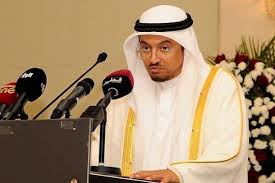By Andrew Warshaw
May 6 – Qatar’s labour minister has pledged to abolish the country’s controversial ‘kafala’ employment system, which has become a major focus of criticism since the Gulf state was awarded the 2022 World Cup, before the end of this year.
Long condemned by human rights groups, under the scheme employers can prevent foreign workers from changing jobs or leaving the country.
Dr Abdullah bin Saleh al-Khulaifi said he was “90 percent” certain the system would be replaced by the end of 2015. “I hope it will be prior to the year end,” Khulaifi told a briefing of foreign reporters in Doha. “We discussed it, our stakeholders have looked at it… Now it is on track.”
Khulaifi also said Qatar would fully implement another major labour reform – an electronic payment system for thousands of migrant labourers – by mid-August.
This would ensure that up to one million workers get paid on time. Many working on World Cup infrastructure have complained that payment is often delayed.
“We are not hiding from our problems here in Qatar, we are facing them,” said Khulaifi. “We know that things aren’t perfect but they are better than they were a year ago and I promise you they will be better a year from now.”
Scores of Nepalese migrant workers in Qatar have lost their lives working on building sites but 2022 World Cup chief Hassan al-Thawadi insists that no-one involved in 2022 stadium projects has died because of industrial accidents.
“We have had about 4.8 million working hours. We’ve got about just over 2,500 workers and about five stadiums – we are at the early stages of construction,” said al-Thawadi, secretary general for Qatar’s Supreme Committee for Delivery and Legacy. “The World Cup stadium projects that we are responsible for, there have been no fatalities and no major injuries as well.”
According to Amnesty International, replacing kafala with a contract system does not go far enough.
Mustafa Qadri, Gulf migrant rights researcher for Amnesty, said the ability to leave the country under the proposed changes would “still be a situation of forced labour because the employer still has the power over the employee”.
Meanwhile, a German television station claimed this week that several of its reporters were detained in Qatar for four days and had equipment confiscated while filming a documentary on the conditions of migrant workers. The programme reportedly also contains new evidence of alleged corruption in the Qatari World Cup bid.
Investigative reporter Florian Bauer, having returned to Germany ahead of this week’s airing of The Selling of Football: Sepp Blatter and the Power of FIFA, led the complaints via social media. “We got arrested in Qatar, interrogated by the police and the intelligence service,” he wrote on Twitter. “Not allowed to leave the country for days. Arrested in Qatar, all material erased, equipment demolished. What is FIFA saying to this?”
Bauer said he was trying to film a balanced piece and would have loved to have someone from the Qatari government to get their side of the story.
Qatar’s World Cup organisers hit back instantly by saying the arrests were not connected with 2022 or FIFA and that “any suggestion to the contrary is explicitly false.”
“Any media outlet wishing to film in Qatar requires a film permit to do so, as is common in many countries,” a statement said. “Any working journalist who has visited Qatar will be aware of this process and understands that filming in specific locations without permission runs the risk of legal repercussions. The journalist in question has visited Qatar several times before.”
“Furthermore during the same period a second German film crew from the same German network also visited Qatar, gaining access to numerous locations and stakeholders throughout the country. To our knowledge they encountered no such problems.”
Contact the writer of this story at moc.l1745011748labto1745011748ofdlr1745011748owedi1745011748sni@w1745011748ahsra1745011748w.wer1745011748dna1745011748

